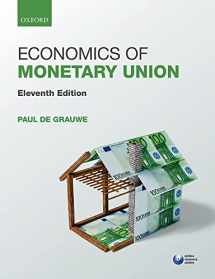
Economics of Monetary Union
Book details
Summary
Description
The eleventh edition of Economics of Monetary Union provides a concise analysis of the theories and policies relating to monetary union. The author addresses current issues surrounding the Eurozone, including; a critical discussion of the costs and benefits of possible exits by its member countries, an analysis of the role of the ECB as new single supervisor and detail on the sovereign debt crisis.
In Part One the author examines the implications of adopting a common currency, assessing the benefit to each country from being a member of the Eurozone, whilst also questioning whether other parts of the world would gain from monetary unification. Part Two of the book looks at the problems of running a monetary union by analysing Europe's experience and the issues faced by the European Central Bank.
Contents List
Part One: Costs and Benefits of Monetary Union
Chapter 1 The Costs of Common Currency
Chapter 2 The Theory of Optimum Currency Areas: A Critique
Chapter 3 The Benefits of a Common Currency
Chapter 4 Costs and Benefits Compared
Part Two: Monetary Union
Chapter 5 The Fragility of Incomplete Monetary Union
Chapter 6 How to Complete a Monetary Union?
Chapter 7 The Transition to a Monetary Union
Chapter 8 The European Central Bank
Chapter 9 Monetary Policy in the Eurozone
Chapter 10 Fiscal Policies in Monetary Unions
Chapter 11 The Euro and Financial Markets
Online Resource Centre
The Online Resource Centre features:
For Students:
Links to data sources
Essay questions
Paul de Grauwe on Twitter
Links to articles and papers
For Lecturers:
Instructor manual
PowerPoint slides


We would LOVE it if you could help us and other readers by reviewing the book
Book review



